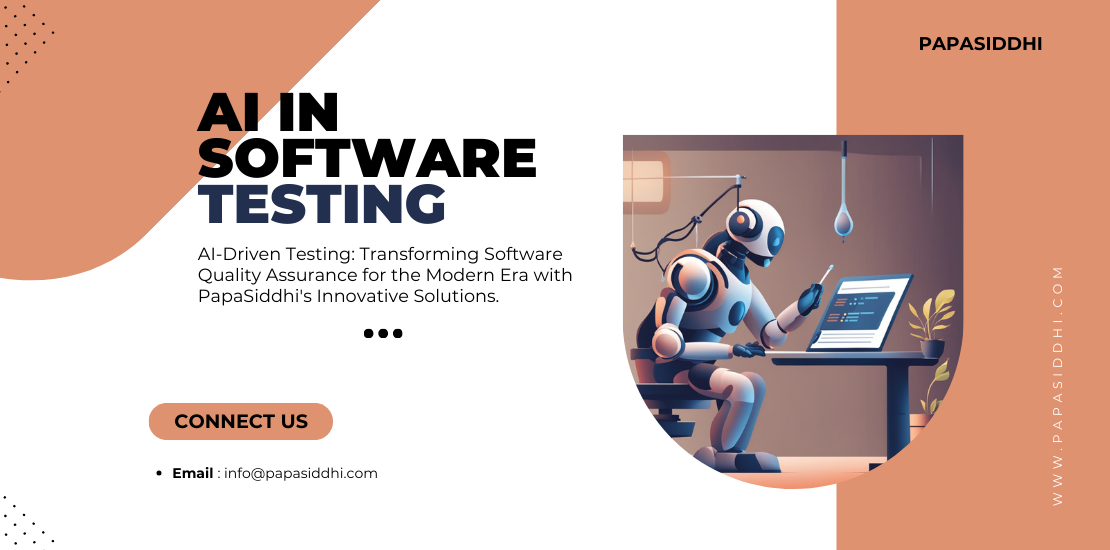- February 22, 2024
- Posted by: papasiddhi
- Category: Artificial Intelligence

Empowering Software Testing: AI’s Impact on Quality Assurance – Insights from PapaSiddhi
In the dynamic realm of software development, ensuring quality while adhering to tight deadlines is a perpetual challenge, pertinent to businesses, organizations, and testing professionals alike. While traditional testing methodologies have proven effective, they often struggle to keep pace with the evolving landscape of modern software development practices. However, with the advent of Artificial Intelligence (AI), a transformative era in software testing is unfolding, promising to revolutionize how organizations ensure the quality and reliability of software products, benefiting testers across the spectrum and enhancing overall business outcomes.
AI’s Role in Testing: A Game-Changer for All
Artificial Intelligence presents a myriad of capabilities that reshape the software testing lifecycle, catering to the needs of businesses, organizations, and testing professionals. Among its most significant contributions is in test case generation. AI algorithms possess the ability to automatically generate comprehensive test cases, intelligently identifying critical scenarios and maximizing test coverage. This not only saves time but also ensures meticulous testing, mitigating the risk of unnoticed bugs creeping into production, benefiting all stakeholders involved in the software development process.
Moreover, AI-driven testing tools excel in automated test execution. By autonomously running test cases and adapting to changes in the codebase, these tools streamline the regression testing process, facilitating faster feedback loops and more agile development cycles. This empowers testing professionals to confidently navigate through the testing phase, with AI acting as a continuous validation mechanism, ensuring the integrity of the software being tested, while also providing businesses and organizations with the assurance of reliable software products.
Predictive Insights and Anomaly Detection: Enhancing Testing Efforts
Beyond test execution, AI offers predictive insights into software quality, a boon for businesses, organizations, and testing professionals alike. By analyzing various factors such as code complexity, historical defect data, and developer performance, AI algorithms can predict areas of the software prone to defects. This proactive approach allows testing efforts to be focused where they are most needed, optimizing resources and enhancing overall software quality, ultimately benefiting the business or organization by delivering robust and reliable software products to market.
Furthermore, AI’s prowess in anomaly detection during testing is invaluable for all stakeholders involved. Leveraging machine learning techniques, AI algorithms can detect subtle deviations from expected behavior, flagging potential defects or security vulnerabilities early in the development process. This empowers testing professionals to adopt a proactive approach towards defect identification and mitigation, reducing the likelihood of critical issues surfacing in production, thereby safeguarding the business or organization’s reputation and bottom line.
AI Tools: Driving Efficiency and Effectiveness
In addition to test case generation and execution, AI tools are revolutionizing software testing by driving efficiency and effectiveness across the board. These advanced tools leverage AI algorithms to analyse vast amounts of data, identify patterns, and optimize testing processes. By automating repetitive tasks, AI tools enable testing professionals to focus on higher-value activities, accelerating the pace of testing and improving overall productivity. This translates into faster time-to-market for businesses and organizations, ensuring that they stay ahead of the competition in today’s fast-paced digital landscape.
Five AI Tools for Software Testing
- Applitools: Utilizes AI-powered visual testing to identify visual anomalies across various platforms and devices, ensuring pixel-perfect rendering and user experience.
- Testim: Employs AI for creating and maintaining automated tests, providing smart recommendations for test creation and execution to enhance efficiency.
- Mabl: Offers autonomous testing powered by AI, enabling self-healing tests, intelligent test generation, and actionable insights to streamline testing processes.
- Tricentis Tosca: Integrates AI-powered risk-based testing to optimize test coverage, prioritize tests, and identify high-risk areas for more effective testing.
- Test.ai: Utilizes AI for autonomous testing of mobile applications, automatically generating and executing tests across different devices and platforms, improving test coverage and efficiency.
PapaSiddhi’s Commitment to AI-Driven Testing: A Partner for All
At PapaSiddhi, we recognize the transformative potential of Artificial Intelligence in software testing. Leveraging our expertise in software development and AI technologies, we are committed to delivering cutting-edge solutions that redefine the way software quality is assured, benefiting businesses, organizations, and testing professionals alike. By harnessing the power of AI-driven testing practices, we empower stakeholders to accelerate innovation, improve software reliability, and deliver exceptional user experiences in an increasingly competitive landscape.
In conclusion, the integration of Artificial Intelligence into software testing marks a paradigm shift, offering unparalleled benefits to businesses, organizations, and testing professionals alike. Embracing AI-driven testing practices is not just a competitive advantage; it’s a necessity in today’s rapidly evolving digital ecosystem. With PapaSiddhi as your partner, the future of software testing is bright, powered by AI innovation and driven by a commitment to excellence, benefiting all stakeholders involved in the software development lifecycle.
Leave a Reply
You must be logged in to post a comment.
